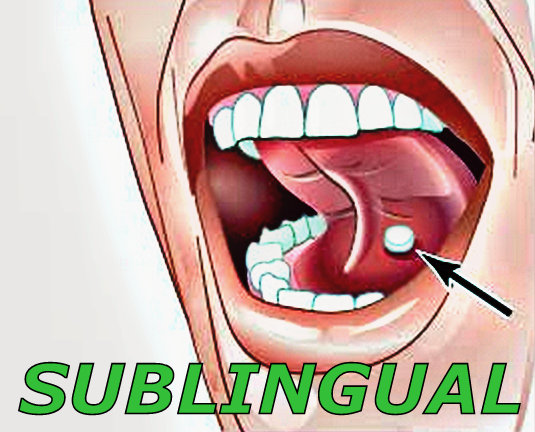Sublingual Administration: A Swift Path to Medication Absorption
In the realm of medication delivery, the term “sublingual” carries profound significance. It refers to a method of administration that offers unparalleled speed and efficiency in delivering medication or supplements into the bloodstream. This article serves as your comprehensive guide to sublingual administration, unveiling the science behind this remarkable technique and its myriad advantages.
How Sublingual Works
Sublingual administration isn’t mere pharmaceutical jargon; it’s a process that can significantly impact the effectiveness of medications and supplements. To grasp its significance fully, let’s delve into the mechanics of how sublingual delivery operates and why it outpaces conventional methods.

sublingual
Advantages of Sublingual Administration
As you explore the world of sublingual administration, you’ll uncover a treasure trove of advantages that have revolutionized the way medications and supplements are absorbed. Here, we shed light on the remarkable benefits that make sublingual a preferred choice for many.
Medications Administered Sublingually
Sublingual administration isn’t a one-size-fits-all approach, but rather a method tailored to specific medications and supplements. Let’s explore some common drugs and supplements that shine when administered sublingually:
Nitroglycerin:
Used to treat angina (chest pain), nitroglycerin is a classic example of a sublingual medication. Placing a nitroglycerin tablet under the tongue allows for rapid absorption and quick relief from angina symptoms.
Vitamin B12:
For individuals with B12 deficiency, sublingual B12 supplements have gained popularity. They provide a swift route to replenishing essential nutrients, especially for those with absorption issues in the digestive system.
Pain Medications:
Some pain relievers, like certain opioids, are formulated for sublingual administration. This method offers faster pain relief, making it valuable for managing acute pain.
Allergy Medications:
Sublingual allergy tablets have emerged as a convenient alternative to injections for some allergy sufferers. They can desensitize the body to specific allergens over time.
Hormone Replacement Therapy:
Hormone replacement therapy (HRT) for conditions like menopause often includes sublingual hormone tablets. This approach enhances the bioavailability of hormones.
Proper Sublingual Technique
Administering medication or supplements sublingually requires precision to ensure optimal absorption. Here’s a step-by-step guide to performing sublingual administration correctly:
Wash Hands:
Start with clean hands to prevent contamination.
Read Instructions:
Review the medication’s instructions to ensure sublingual administration is appropriate.
Place Medication:
Position the tablet or liquid medication under your tongue, as close to the floor of the mouth as possible.
Hold It:
Allow the medication to dissolve naturally. Refrain from swallowing or chewing it.
Timing Matters:
Follow the recommended time for holding the medication sublingually. It typically ranges from a few seconds to a few minutes.
Swallow Residue:
If any residue remains after sublingual absorption, it’s safe to swallow it with water.
Safety and Precautions
While sublingual administration offers remarkable advantages, it’s essential to be aware of safety considerations and potential side effects. Here are some vital precautions:
Medication Compatibility:
Ensure that the medication or supplement you intend to take is designed for sublingual use.
Dosing Accuracy:
Follow dosage instructions meticulously to prevent overuse or underuse.
Allergies:
Be aware of any allergies to medication components, and inform your healthcare provider.
Side Effects:
Some individuals may experience mild irritation under the tongue. If severe side effects occur, seek immediate medical attention.
Consultation:
Always consult your healthcare provider before starting a new medication or supplement, especially if you have underlying medical conditions or take other medications.
FAQs and their answers related to sublingual administration:
FAQ 1: What is sublingual administration?
Answer: Sublingual administration is a method of delivering medication or supplements by placing them under the tongue. This allows for rapid absorption into the bloodstream through the sublingual mucosa.
FAQ 2: What are the advantages of sublingual administration?
Answer: Sublingual administration offers rapid absorption, avoids the digestive system, provides increased bioavailability, and is convenient and painless.
FAQ 3: Are all medications suitable for sublingual administration?
Answer: No, not all medications are suitable for sublingual administration. Only specific medications and supplements are formulated for this route.
FAQ 4: How do I properly administer medication sublingually?
Answer: Place the medication under the tongue as close to the floor of the mouth as possible. Allow it to dissolve naturally without swallowing or chewing, following the recommended time for holding it sublingually.
FAQ 5: What types of medications can be administered sublingually?
Answer: Medications that can be administered sublingually include nitroglycerin for angina, certain pain relievers, vitamin B12 supplements, allergy tablets, and hormone replacement therapy, among others.
FAQ 6: Is sublingual administration safe?
Answer: Sublingual administration is generally safe when done correctly and with medications specifically designed for this route. However, it’s essential to follow dosing instructions and consult a healthcare provider.
FAQ 7: Can children use sublingual medications?
Answer: Sublingual medications are becoming more popular for pediatric patients due to their ease of administration. However, dosing and suitability should be determined by a pediatrician.
FAQ 8: What are the potential side effects of sublingual administration?
Answer: Mild irritation under the tongue is possible. If severe side effects occur, seek immediate medical attention. It’s important to be aware of any allergies to medication components.
FAQ 9: Are sublingual medications and supplements available over the counter?
Answer: Some sublingual supplements are available over the counter, but others require a prescription. Always consult with a healthcare provider before starting any new medication or supplement.
FAQ 10: How can I learn more about sublingual options for my healthcare needs?
Answer: To explore sublingual options for your healthcare needs, consult your healthcare provider. They can provide recommendations based on your specific conditions and requirements.
Conclusion
In closing, sublingual administration isn’t just a method; it’s a doorway to rapid and effective relief for various medical conditions and nutritional needs. By understanding its mechanics, benefits, and proper techniques, you can harness the power of sublingual delivery to enhance your health and well-being.




